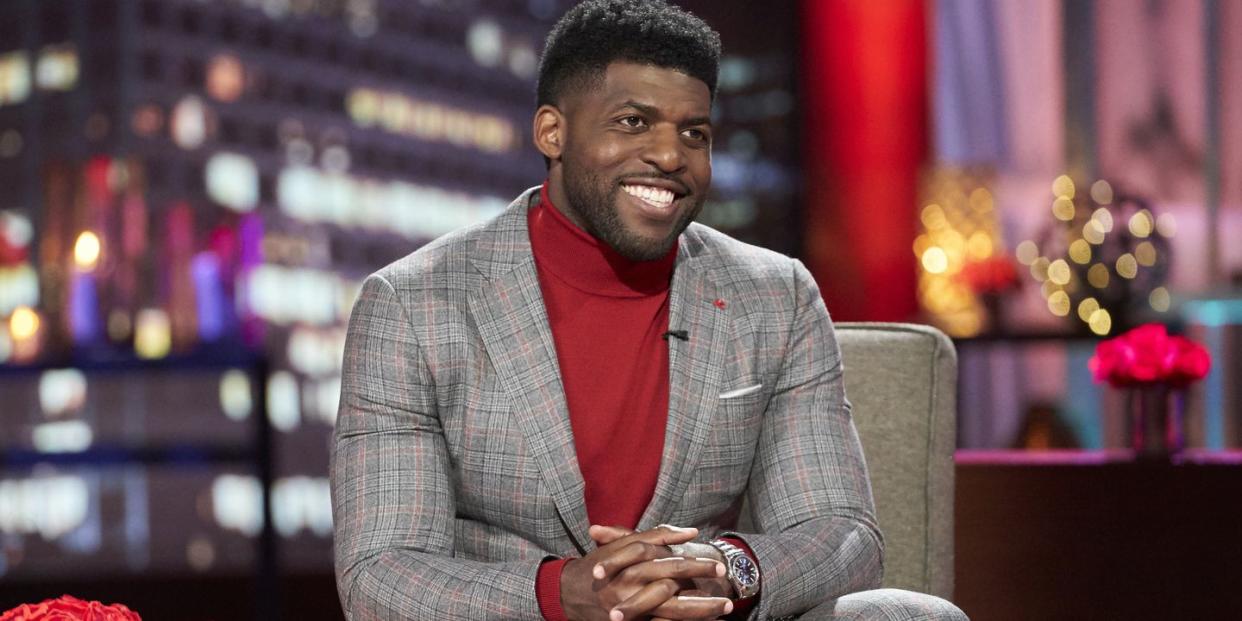Emmanuel Acho Wants Us to Start Having Uncomfortable Conversations About Race With Our Kids

When Oprah Winfrey called up Emmanuel Acho after his YouTube video series, "Uncomfortable Conversations with a Black Man," went viral, she asked what he wanted to do with it. "Oprah," Emmanuel said, "I want to change the world."
The former NFL football player turned the success of that video series into his first New York Times bestseller, Uncomfortable Conversations with a Black Man, but realized that it's not just adults who need to be engaging in discussions about race and bias. Recently, he released Uncomfortable Conversations with a Black Boy to bring these tough talks to the next generation.
"Far too often, we say, 'My children aren't ready for these conversations. They're not ready to engage in this dialogue,'" Emmanuel told Good Housekeeping during an Instagram Live on Tuesday. "But what we're really doing is using them as an excuse, because we aren't ready to have the conversation. But it's our job, as adults, to get ready."
In Emmanuel's new book, he writes about his childhood growing up with Nigerian parents and attending mostly white schools. It wasn't until he went off to college to play football and then got drafted into the NFL that he became more immersed in Black culture and began to understand the many insidious forms of racism. From being told he didn't "act Black" by well-meaning friends, or feeling separate from his classmates in ways he didn't yet have the language to call out, Emmanuel says racial insensitivity can take root on the playground, even if parents think they're teaching their kids to be kind.
"There's a difference, in my opinion, between racism and racial ignorance," Emmanuel explains. "I want to short circuit, dismantle and disarm racial ignorance and racial insensitivity before it gives birth to racism."
Far too often, he adds, parents teach their kids not to see color, or to treat all of their classmates kindly, regardless of what they look like. But actions speak louder than words.
"Far more is caught than is taught," he says. "If you, as a parent, don't have any Black or brown friends, then that's what your children and your teenagers are watching during their most permeable years. What are you showing your children?"
While Emmanuel's new book is geared toward kids in middle school and early high school, he says it's never too early to start short talking about racism around the dinner table.
"Before you know it, they're going to be in college and gone and now you haven't done your job to equip them," he points out. But he also cautions adults and children alike against starting difficult conversations before educating themselves. Just like learning the customs of a different culture before visiting a new place, Emmanuel encourages people to learn about each other.
"When you're having dialogue with other people who don't necessarily look like you, educate yourself in advance. Now, when somebody does offend you, do your best to extend them grace because an eye for an eye leaves everyone blind," he says. "But do your part to learn the rules of engagement prior to dialogue."
Because he's no stranger to having these tough conversations, Emmanuel acknowledges that they can be a source of discomfort. But he wants to empower both young readers and adults to stick with that discomfort regardless.
"All great things are birthed through [discomfort]," he says. "Far too often, we listen to respond, as opposed to listening to understand. That's how we best engage in true meaningful dialogue: Listening to understand and then we can curate our response from there."
You Might Also Like

